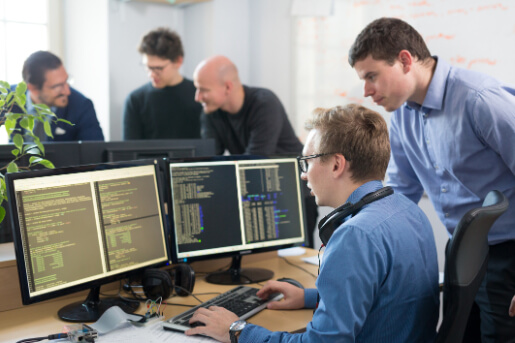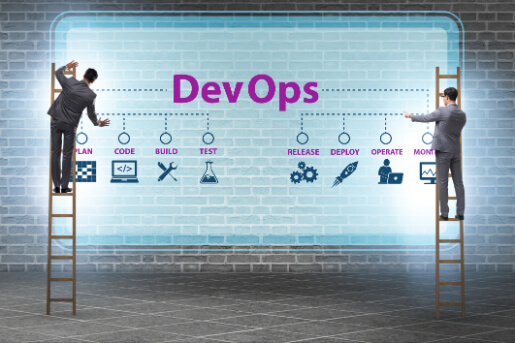Sabio: What is a Full-Stack Web Developer?

What is a Full-Stack Web Developer Salary?
Job demand for full-stack web developers has seen an annual growth of 35% and is number four on LinkedIn’s Top Emerging Jobs for 2020. Full-stack web developers can make up to $140K a year, depending on the employer. So the real question becomes: what does it take to apply? We’ll examine the role and requirements it takes to be a successful full-stack web developer.
What is a Full Stack Developer?
A full-stack developer is an individual who knows both front-end and back-end development. This web developer has worked in and can handle the complete implementation of a website, whether defining project management or installing operating systems on a server. A full-stack web developer can step in at any time during the web development process and execute any task.
Full stack refers to a programmer’s experience and knowledge of various programming languages and processes. But, the programming languages are in a developer’s “stack” can vary. Using the term full stack implies that they are competent in many languages on the front-end and back-end.

Project Management and DevOps Also Factor into the Stack
Full stack can also mean that the developer can handle project management and has DevOps knowledge. A full-stack web developer who can also help design, timeline, and create a project infrastructure is very valuable. Understanding business logic and user experience, the developer can also contribute to the strategy. Because of this, they often work as a lead developer.

DevOps knowledge is also critical to have in case the developer needs to:
- Install operating systems, such as Linux servers.
- Managing complex dependencies like installing a current version of Python.
- Moving code for GitHub into production.
By becoming a full-stack web developer, the individual has valuable skills, knowledge, and experience that can be utilized for any role in the web development process and for working with project teammates.
Related Link: 2020’s Most In-Demand Software Developer Skills
What Encompasses Full Stack Web Development?
Full-stack web development requires proficient experience and knowledge of all the programming languages and frameworks for front-end and back-end web development. This also includes an experienced skillset setting up and configuring servers, networks, and hosting environments.
Back-End Web Development
In the back-end, developers are manipulating data to be used by the front-end. In a back-end development role, a full-stack web developer will:
- Set up and manage databases and servers.
- Coding to interact with the databases like PostgreSQL, MySQL, and Mongo that use the language SQL.
- Code, program, and manage any applications, algorithms, or API’s using languages like Python, Ruby, PHP, and Java.
- Leveraging cloud-based platforms for infrastructures like Heroku or Amazon Web Services.
Any programming functionality that runs on the server or database is considered back-end development.
Front-End Web Development
Front-end web development includes the user interface and presentation of a website and how it behaves on other browsers and mobile devices. In a front-end development role, a full-stack web developer will:
- Design and create a user interface design and user experience design.
- Design graphics and layouts using Photoshop and Illustrator.
- Program and write in several web development languages, including HTML, CSS, JavaScript, and React.
- Identify and fix bugs.
When working on the front-end, A full-stack web developer is handling anything that has to do with client-side development.
Want to round out your skill set in either front-end or back-end web development? Sabio offers full-time or part-time full-stack web development programs that can quickly certify you in the skills you need.
Related Link: Sabio’s Frequently Asked Questions
Why Become A Full-Stack Web Developer?
In reality, you may be hired for a front-end or back-end position. But by being a full-stack web developer, you’re more valuable to the team because you can work, troubleshoot, and assist in all areas of the web development process.
When you have more knowledge about the other product components, you are more useful to all segments of your team in troubleshooting, planning, and testing. It will also help you effectively communicate and anticipate challenges that allowed the whole team to move forward with better communication and expectations.
Having both front-end and back-end skills makes you a better developer because you understand both sides’ requirements, needs, and limitations. It also makes you more attractive for a leadership position because you can mentor, direct, and assist the entire project team.
How To Become A Full-Stack Web Developer
Becoming a full-stack web developer takes a willingness to learn new skills and programming languages, time, and, most of all, experience.
Get Certified
You’ll want to get certified in any programming or design areas that your traditional schooling didn’t accomplish. To fast-track your skillset, you should attend programs and schools to get certified in:
- Front-end programming languages
- Graphic design user interface and software
- Back-end languages
- Databases
- Storage
Sabio coding schools specialize in front-end and back-end programs to get you the training you need to become a full-stack web developer. Their boot camp programs utilize a project-based learning approach. This approach simulates an actual work environment where students can learn to collaborate and execute in real-world scenarios.
Time and Experience
Don’t expect to be a full-stack web developer overnight. You’ll need to put in time and work in several positions to become a sought-after full-stack web developer. Take on projects and communicate with your employer about opportunities to work on both ends of development. As your experience grows, you’ll become an invaluable and top-performing employee.
Seeking a Future as a Full-Stack Web Developer
Becoming a developer will take time and training, but you can gain the skills you need to land your dream position in the tech industry with effort. By having the knowledge and training in both front-end and back-end development, you will execute, collaborate, and troubleshoot as a top performer on your team.
Sabio is a leading technical coding school with several campuses in Southern California with remote learning programs. They specialize in Node.js, .NET, Blockchain, and Product Management to teach you the necessary skills to become a full-stack web developer. Sabio is motivated to help people break into the tech industry and get more people, especially women, Latinos, and other people of color into high-paying tech positions.
Ready to get started on becoming a full-stack web developer? Apply to Sabio’s 20-week or 24-week part-time full-stack web development program to become in demand in today’s tech industry.
Related Link: Sabio’s Deferred Tuition Program
Posts you might like
- Navigating the Tech Job Market: Insights from Sabio Alumni and Cybersecurity Opportunities
- Embracing the Climb: A Leader's Growth Mindset Journey
- This is the Perfect Time to Dive into Coding and Automation, This is Why!
- Troubleshoot Like a Pro: The Art of Debugging in Programming
- Beyond Bootcamp: Diverse Career Avenues in Tech
- Spotting Burnout in Tech Job Hunts: 6 Warning Signs & Ways to Overcome It
- Get Hired: Essential Knowledge for Emerging Programmers
- 7 Steps to Build a Personalized Continuous Learning Plan for Coders
- Empower Your Journey: Benefits of Remote Code Bootcamps
- Proactive Steps: Daily Rituals for the Job-Hunting Programmer
- Don't Sabotage Your Tech Job Search: Mistakes to Skip
- Unleashing Opportunities: How Bootcamp Career Services Propel Success
- From Lines to Offers: How Your Coding Experience Shapes Market Value
- Optimizing Success: Your Attitude in Coding Bootcamps
- Roadmap to Success: Tech Job Hunt with a Coding Bootcamp Mentor
- Crafting Your Tech Startup Roadmap from Bootcamp Grad
- Tips for Creating a Resume That Gets Interviews for High-Experience Jobs After Coding Bootcamp
- Accelerate Your Career: Embrace Bootcamps for Real-World Programming Skills
- The Coding Craft: Essential Skills Learned at Bootcamps
- Bootcamp Bonds: Tapping into Networks for Tech Employment
- Coding Confidence Booster: The Benefits of Coding Mock Interviews
- Programming by the Clock: The Impact of Effective Time Management
- Coding Freedom: The Value of Learning at Your Own Speed
- Calm Code Journey: Overwhelm-Free Bootcamp Success
- Polish Your Pitch: Tech Interview Communication Essentials
- Inside the Loop: Coding Bootcamps and Tech Industry Strategies
- From Zero to Hired: Decode the Experience Question in Tech Interviews
- Solving the Puzzle: Refining Your Problem-Solving as a Programmer
- The Art of Practicality: Using Coding Languages Without Overlearning
- Practice Makes Perfect: The Key to Software Engineering Brilliance



